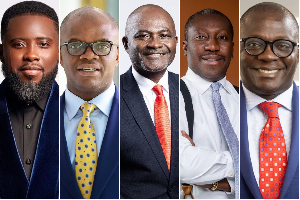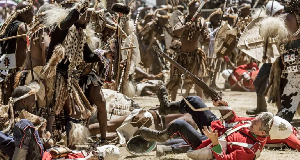Just so we understand what this “Dog Match” means I shall start with the old story of Pavlov, the Russian.
Pavlov, in an experiment, rang a bell every time he fed his dogs. Bell rang and food appeared. In time, the poor dogs could salivate at the bell, even without food in sight. And Ivan Pavlov, the Russian, called the phenomenon "conditioned response".
Soon, the Pavlov magic will begin to work on African soccer, thanks to the generosity of an enterprising Nigerian. And Ghanaians, or rather Africans, will discover its pernicious effect; that is if they haven’t already.
As Ghanaian papers tell it, for losing to Nigeria in the qualifier match for the World Cup, both managers and members of the Ghana team received a gift of $25,000 from the Nigerian philanthropist. For months, they were silent about the gift until the press in Ghana started sniffing around and discovered the shady conduct. Then a public discussion of the deal ensued; except no one openly called the gift a “bribe.”
Before the encounter with Nigeria, Ghana, now a spoiler, played Liberia and won. Next in line was Nigeria. For Nigeria to be assured the berth, it not only had to defeat Ghana, but to win big to overcome Liberia’s potential threat to fill the slot. Nigeria won by three goals to Ghana’s nil. Nigeria, by one lone point (16 pts to Liberia’s 15) catapulted herself to the next round.
Nigeria is already a powerhouse in African soccer, but the coincidence of this "gift" leaves a sore mark. In World Cup soccer, few teams from Africa have reached the top. Only four senior national teams are in the top 42 rankings (out of 203) as of September of this year. The story for Summer Olympic soccer, however, is more spectacular. In 1992, Ghana brought home the bronze. And in 1996 and 2000, Nigeria and Cameroon, respectively, brought the gold and the soccer glory to Africa.
After Cameroon’s victory in Sydney 2000, her coach said “I don’t think we are very far from (winning) a World Cup in few years from now.” Indeed, under an all African soccer team the World Cup could have a permanent home on the continent!
However, look at us now; instead of hunting for the finest talent, we are resorting to “gift” giving. We may regret the outcome.
But, it is just soccer, the uninitiated to the sacramental nature of African soccer will say. Well, it is more than just soccer. It is our manhood, our nationhood, our brawn and brain chasing after that round ball. In short, soccer is our safest outlet for pent-up frustrations, short of going to war. It is the most spectacular team sport. The world watches when you play.
We are still hoping to win; waiting for our turn to kick the behind of some arrogant nations, so to speak; to get even without declaring “intifada”. We salivate at the opportunity, because it is our only realistic chance now for world greatness. Anything else is a charade.
However, the clear line between the “reality” of playing in the World Cup and the “charade” of participating in one is about to be blurred. The sacramental trophy of winning with the most talent is now under attack by this Nigerian “gift”. Who would know whether Liberia had the best chance for our aspiration for a first World Cup? No wonder some are angry at the Nigerian. They call his act bribery. Others, however, defend him. They claim his offer is a real gift, no matter how rare.
Could expectation belie this claim of gift? If the purpose of a bribe is to induce a favorable outcome for the giver, then no contrived definition of a gift will change the intent of the Nigerian philanthropist. Clearly, he did not intend for Nigeria to lose to Ghana.
But so far, no one is openly calling this Nigerian largesse a bribe.
The reluctance may be understandable. Given our culture, the hospitality and cordiality of gift extension can be said to be African: if the gift came before the match, then it would be a bribe. But since it came after, it should remain a gift. The excuse may lie in our cultural reasoning, but the fault can only be blamed on wise guys who never heard of Old Ivan Pavlov.
But in Africa, we know enough now to be wary about the damage both “bribe” and “gift” leave in their wake.
The town-planner, who fails to run a street straight through town, though the master plan required it, knows about the damage. The water engineer, who allows more load in a neighborhood, even though the main pipes are constructed to bring in less, has prior knowledge of the impairment. In short, our social condition is in a mess because of corruption. So would our pride when our first ever candidate in a historical contest for the election of the first president for all Africa sells out to a Boer on the promise of some million dollars!
Since Pavlov, inducement, expectation, and reward can be said to be essential parts of the "conditioned response" process. The promise of a “gift” can induce some teams to lose for others to win. It can also create an ongoing condition for game fixing. When it is offered, or by whom is a matter of time. Can African nations, for all our financial woes and HIPC condition, afford to shift the competition from talent to bank account?
If so, then let’s start singing now the new hymn to our sport republics: “To the nation with the deepest pocket go the spoils of soccer victory.”
And do away with the patriotic songs we sing to send our athletes off to competition; songs that enshrine our collective expectations. And the cheers at send-offs that imply jeers awaiting the athlete who comes home in defeat. No more of that stuff. The gift of $25,000 has changed all that.
Next time you attend a World Cup qualifying match between say Nigeria and Ghana, don’t look for skill or the super-natural. Look for a resolute man standing behind the Nigeria goal post, dressed in a big Agbada, with a smart looking brief case and a whisk. He is the man who gave the $25,000 the last time. The eleven Ghanaian players will also be looking at him, fixated in anticipation of gift to come, if they played poorly. At this point, remember Pavlov, the Russian!
And when the ball lands in the net, jump up and scream “goal na net, money na hand!”
But where are we going to with this trend of gift giving? Will the next benefactor come from America? Or can he be a Brit, German, Italian, Japanese or French? These nations are by far richer. They only have to start playing this game too, and you can bet that none of the best teams in Africa will ever make it to World Cup finals. You can then tell the Cameroon coach to kiss his aspirations goodbye.
That’s when the Pavlov process really kicks in. Instead of kicking the behind of the powers that be, they will be kicking ours. As always!
E. Ablorh-Odjidja, Washington, DC. November 15, 2001
Soccer News of Saturday, 24 November 2001
Source: e. ablorh-odjidja (profileafrica.com)












